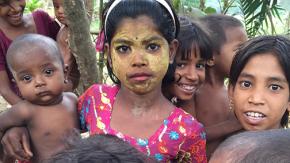Putting trade before human rights
looks at the scandal unfolding around the State Department's attempt to censor its own experts on human trafficking.
THE U.S. State Department's annual report on human trafficking is coming under intense scrutiny for the interference of top diplomats in determining the rankings assigned to several countries, including Malaysia and Saudi Arabia, that the Obama administration wishes to portray in a favorable light.
Such diplomatic meddling in State Department reports isn't exactly new, but the scale of intervention by high-level officials, including Secretary of State John Kerry's chief of staff, in this year's report is unprecedented.
Of the 17 instances in which the analysts in the State Department's Office to Monitor and Combat Trafficking in Persons differed with top-level diplomats on rankings of particular countries, the analysts prevailed in only three instances, the worst ratio in the 15-year history of the report, according to a Reuters investigation that first reported the story.
The upgrading of Malaysia's ranking is particularly troubling, given the recent high-profile revelation in May of mass graves of 139 Rohingya migrants who were sold into slavery after fleeing Burma. The mass graves were discovered in a series of abandoned camps near the border of Thailand used by human traffickers to hold their captives.

The widespread use of slave labor in Malaysia's highly profitable palm oil, construction and electronics industries had earned it a Tier 3 ranking--the lowest on the scale--in the previous year's report. Of Malaysia's 4 million foreign workers, many face large smuggling debts and the confiscation of their passports, which leaves them highly vulnerable to shady recruiting companies offering them transport. Women and children are especially susceptible to being forced into Malaysia's sex industry.
Yet, the legislation passed by Congress in June that gave Obama expanded powers to negotiate trade agreements prohibited deals with Tier 3 countries. This posed a dilemma for the Obama administration, which desperately wanted to include Malaysia in the Trans-Pacific Partnership (TPP). The U.S. Navy currently dominates, with Malaysia's cooperation, the vitally strategic Straits of Malacca, which is a thin waterway connecting the Pacific and Indian Oceans, and wants to keep it that way. Last year, 85 percent of China's imported oil passed through the strait.
While the experts charged with writing the report noted that the number of human-trafficking convictions in Malaysia dropped to three last year from nine in 2013, the State Department's top officials prevailed in upgrading Malaysia's ranking, allowing it to stay part of the TPP trade deal.
"We are incredibly disappointed by the State Department's decision to unfairly upgrade Malaysia in this year's Trafficking in Persons report," said Melysa Sperber, director of the Alliance to End Slavery and Trafficking (ATEST), a coalition of 14 U.S.-based human rights organizations. "Downgraded just last year, Malaysia demonstrated virtually no progress in addressing major human rights violations. In fact, more egregious incidents of forced labor, mass graves and slave camps have emerged in recent months. It's a blemish on President Obama's legacy that he chose to promote trade over human rights."
SAUDI ARABIA also had its status upgraded from Tier 3, even though the 2015 report notes that there has been practically no effort to address the withholding of passports of migrant workers or the nonpayment of wages by employers--both of which violate Saudi law. Saudi officials also routinely arrest and detain migrant workers found to be "illegally" in Saudi Arabia, essentially punishing them for being the victims of human trafficking.
One possible reason for the upgrade in ranking is Saudi Arabia's anger at the U.S. nuclear deal with Iran, which Saudi officials strenuously oppose. An upgrade from Saudi Arabia's Tier 3 status, which can trigger sanctions that limit access to aid, from the U.S., the International Monetary Fund or the World Bank, may have been offered to soften the blow of the Iran deal. State Department diplomats are often lobbied aggressively by their counterparts for higher rankings in order to avoid the stigma and other negative fallout from low rankings.
"The vultures circled," said Phil Robertson, deputy director of the Asia Division for Human Rights Watch. "There's almost an orientation of diplomats to cover the ass of countries that they're posted in. And it reflects poorly on State Department leadership that they allowed this to go forward."
The U.S., of course, enjoyed a top Tier 1 ranking for the sixth consecutive year--despite the fact that recent investigative reporting has revealed slave-like conditions in New York's nail salons in addition to chronic forced labor in the agricultural sector. Like in other countries, many migrant workers in the U.S. pay hefty fees to "recruiters" in order to obtain visas and transportation to the U.S. Arriving thousands of dollars in debt, they are compelled to sign contracts and work in inhumane conditions, sometimes for many years, in order to escape from their servitude.
"The United States cannot expect others to clean up their act without taking meaningful action to prevent trafficking right here at home," said ATEST's Sperber. "We must show leadership and ensure that the goods and services Americans use are not tainted with slavery, that migrant workers are not deceived into exploitative jobs and saddled with debt, and that our most vulnerable communities are protected from traffickers."
Darla Bardine, executive director of the National Network for Youth, points out that impoverished youth are also vulnerable to being subjected to forced labor and sex slavery. Said Bardine:
Right now, in America many youth are without a place to call home. Homelessness leaves young people unprotected, lacking essentials to survive, and extremely vulnerable to sex and labor trafficking. For the U.S. to truly be a world leader in ending human trafficking, U.S. Congress must act with urgency to pass the Runaway and Homeless Youth and Trafficking Prevention Act to provide housing and safety to the most vulnerable young people in America. Homeless youth programs have wait lists. Pimps and traffickers don't.


